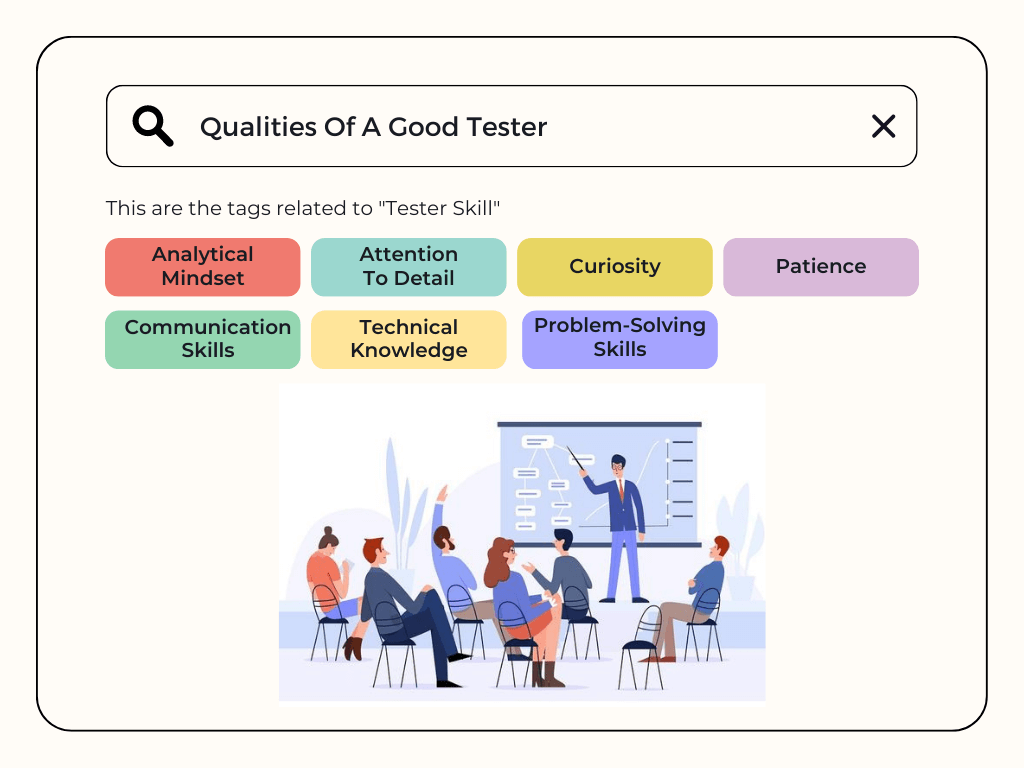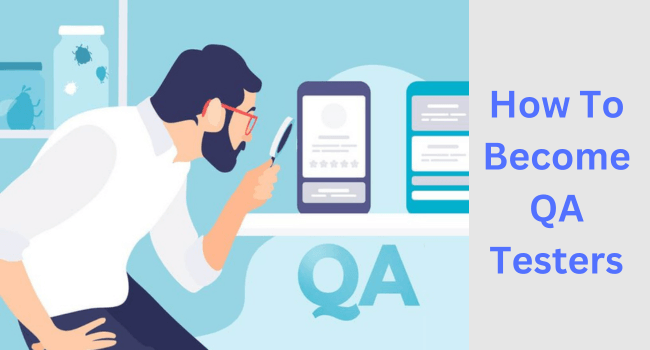In the dynamic and fast-paced world of technology, the role of a tester is more critical than ever. As new software and applications continue to flood the market, the need for thorough and effective testing becomes paramount.
A good tester with the right testing skills and qualities can decide between a product that soars to success and one that falls flat. But what exactly are these Qualities Of A Good Tester that set them apart?
This comprehensive guide will delve deep into the characteristics that define a good tester and qualities of a good tester. We will explore the unique blend of technical knowledge, analytical thinking, and keen attention to detail that makes a tester exceptional.
So, this guide is for you whether you’re an aspiring tester looking to break into the field or a seasoned professional aiming to enhance your skills.

Qualities Of A Good Tester
A good tester is much more than just a bug-finder. They are an excellent guardians of quality. They ensures that the final product aligns with the highest functionality, usability, and performance standards. Here are the tester’s some key qualities that distinguish a good tester:
1. Analytical Mindset
A effective tester possesses an analytical mindset. They are adept at dissecting complex systems, software quality and understanding the intricate interplay between different components.
They can look beyond the surface, delve deep into the system, and identify potential areas of concern in the test design.
2. Attention To Detail
A close eye for detail is a hallmark of a good tester. The great testers can spot inconsistencies, errors, and anomalies in the test design that others might overlook.
They scrutinize every aspect of the system, no matter how minor it may seem, to ensure nothing slips through the cracks.
3. Curiosity
A good tester is inherently curious. They have an insatiable desire to understand how things work.
They constantly ask questions, probe deeper, and seek answers. This curiosity drives them to uncover issues that might not be immediately apparent.
4. Patience
Testing can be a painstakingly meticulous process. It requires a good deal of patience to go through each step methodically without rushing.
A good tester understands this and is willing to invest the necessary time and effort to ensure comprehensive testing.
5. Communication Skills
For professionals tester, the vital skill is effective communication. They must articulate their findings clearly and concisely to developers, project managers, customer, company and other stakeholders.
They should be able to explain the issues they’ve found and their potential impact and suggest possible solutions in a way that’s easy to understand.
6. Technical Knowledge
While not a strict requirement, having a solid understanding of the technology being tested can give a tester a significant edge.
It can help them understand the system better, anticipate potential issues, and communicate more effectively with the development team.
7. Problem-Solving Skills
Testing is not just about identifying problems; it’s also about finding solutions. The skill testers has strong problem-solving skills. They can think on their feet, come up with innovative solutions, and navigate around obstacles that might arise during testing the successful software.
The qualities of a good tester go beyond software testing or technical skills. They encompass a range of soft skills like analytical thinking, attention to detail, patience, and effective communication. All these are the traits of a great testers.
When combined with a deep understanding of the technology being tested, these qualities can make a tester truly exceptional.

How To Become QA Testers
Becoming a QA tester is a blend of acquiring the right education, honing relevant skills, and gaining practical experience. Here’s a more detailed roadmap about tester skills to guide you:
1. Pursue A Degree To Become A Great Tester
Although not a strict requirement, computer science or a related field degree can provide a solid foundation.
It helps you understand the basics of software development and the principles of computer systems.
2. Understand the Basics of Testing
Start by learning the testing fundamentals. Understand different testing methodologies like black box testing, white box testing, and grey box testing.
Familiarize yourself with various testing tools and techniques. Numerous online resources and courses can guide you in this learning journey.
3. Gain Practical Experience To Become A Good Tester
Theoretical knowledge is essential, but hands-on experience is invaluable. Seek opportunities to apply your knowledge in real-world scenarios.
This could be through internships, part-time jobs, or volunteering in software development projects. Experience helps you understand the practical challenges in testing and how to overcome them.
4. Earn A Certification Of Effective Software Testing
Consider earning a certification in software testing. Certifications like ISTQB, CSTE, and CSQA are recognized globally and can significantly enhance your credibility.
They demonstrate your commitment to the field and your proficiency in testing.
5. Stay Updated
The tech industry is dynamic, with new developments emerging frequently. To stay relevant, you need to keep learning and updating your skills.
Attend workshops, webinars, and conferences. Follow industry trends and adapt to new testing tools and methodologies.
Remember, becoming a successful QA tester is a continuous learning and improvement journey. It’s about developing a mindset of curiosity and problem-solving and the willingness to adapt to new technologies and methodologies.
Skills To Be A Great Tester: How A Tester Can Be A Great Tester
Being a great tester is more than just possessing the right qualities or skills. It’s about continuously refining your skills and adapting to the ever-changing tech landscape.
Here are some skills that can elevate you from a good tester to a great one:
1. Technical Skills
Technical skills form the backbone of a tester’s toolkit. This includes a deep understanding of various programming languages, databases, and testing tools.
Familiarity with programming languages like Java, Python, or C++ can help you better understand the code you’re testing. Knowledge of databases can assist you in testing data-driven applications.
Proficiency in testing tools, both manual and automated, can increase your efficiency and effectiveness. Tools like Selenium, JMeter, and LoadRunner are commonly used in the industry.
2. Advantages of Unit Testing
As a tester, you’re often faced with complex systems that need to be broken down and understood. Analytical skills are crucial in dissecting these systems, understanding how different components interact, and identifying potential issues.
It involves a keen eye for detail and the ability to spot inconsistencies and errors others might miss. It also includes the ability to think critically and make logical connections.
3. Communication Skills
You must effectively communicate your findings to stakeholders, including developers, project managers, and clients. This involves clearly articulating the issues you’ve found, explaining their impact, and suggesting possible solutions.
Good communication skills also mean being a good listener, understanding feedback, and implementing it in your work.
4. Problem-Solving Skills
Testing is not just about identifying problems; it’s also about finding solutions. Problem-solving skills involve the ability to think on your feet, come up with innovative solutions, and work around obstacles.
This requires a creative mindset, a deep understanding of the system you’re testing, and the ability to see the bigger picture.
5. Time Management Skills
Testing often involves working under tight deadlines. The time management skills of testers are essential. It ensures that you meet these deadlines without compromising on the quality of your work.
This involves prioritizing tasks, working efficiently, and knowing when to move on from a particular issue.
6. Learning Agility
The tech industry is constantly evolving, with new tools and methodologies emerging regularly.
As a tester, you need to be agile in your learning. Staying updated with the latest trends, learning new tools, and adapting your testing approach.
7. Collaboration Skills
Testing is not a solitary task. It involves working closely with developers, business analysts, and other stakeholders.
Collaboration skills are crucial in working effectively within a team, understanding different perspectives, and achieving common goals.
8. Adaptability
Each project you work on as a tester will have different challenges. Adaptability is key in adjusting to these different environments, learning quickly, and delivering quality work.
9. Ethical Integrity
As a tester, you’re entrusted with the responsibility of ensuring product quality. Ethical integrity is crucial in maintaining this trust, conducting your work honestly, and reporting issues accurately.
10. Resilience
Testing can be challenging, with new issues emerging frequently and solutions not always evident. Resilience is key in navigating these challenges, maintaining a positive attitude, and persisting until you find a solution.
In conclusion, being a great tester is more than having the right qualities. It’s about continuously honing your skills, adapting to new challenges, and maintaining a mindset of lifelong learning. With these skills in your arsenal, you can truly stand out as a tester.
Wrapping Up
Being a good tester is about more than finding bugs. It’s about ensuring the quality of the product and contributing to its success. You can become a great tester by developing the right qualities and skills.
In conclusion, the Qualities Of A Good Tester go beyond technical knowledge. They encompass a range of soft skills like communication, problem-solving, and attention to detail. You can excel as a tester in the dynamic tech industry by developing these qualities and continually learning and adapting.
Frequently Asked Questions
What is a QA tester?
A QA tester, or Quality Assurance tester, is a professional who tests software to ensure it meets the required quality standards.
What are the responsibilities of a QA tester?
A QA tester is accountable for testing software to identify bugs or issues. They also work closely with the development team to ensure that these issues are addressed before the product is released.
What skills do I need to become a QA tester?
To become a QA tester, you need a combination of technical and soft skills. This includes testing methodologies and tools knowledge, attention to detail, problem-solving skills, and excellent communication skills.
Also Read:
Qualities of a Good QA, Test Lead / Manager
- 5 Best DevOps Platform and Their Detailed Guide For 2024 - December 26, 2025
- Top 10 Cross Browser Testing Tools: The Best Choices for 2024 - October 28, 2025
- 5 Best API Testing Tools: Your Ultimate Guide for 2024 - October 26, 2025
